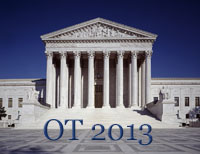US Supreme Court Review: Statutory Interpretation in Criminal Cases
 (This is another post in our series, Looking Back at the U.S. Supreme Court’s 2013 Term.)
(This is another post in our series, Looking Back at the U.S. Supreme Court’s 2013 Term.)
In the first post in this series, I discussed two causation cases in some detail. In this post, I will more briefly summarize the full set of the Court’s criminal statutory interpretation cases from the past term and then offer a few overarching observations.
Here are the cases (excluding habeas corpus decisions):

 Although the Supreme Court decides dozens of cases every year, it has never decided how to decide those cases. That is, the Court has never adopted a governing approach to constitutional interpretation. Instead, the justices seem to bounce from one method to the next, even when considering the same subject matter. What explains this methodological pluralism? Why doesn’t the Court consider itself bound under the doctrine of stare decisis not only to follow the substantive results of earlier constitutional cases, but also the methodological tools it used in getting there?
Although the Supreme Court decides dozens of cases every year, it has never decided how to decide those cases. That is, the Court has never adopted a governing approach to constitutional interpretation. Instead, the justices seem to bounce from one method to the next, even when considering the same subject matter. What explains this methodological pluralism? Why doesn’t the Court consider itself bound under the doctrine of stare decisis not only to follow the substantive results of earlier constitutional cases, but also the methodological tools it used in getting there?